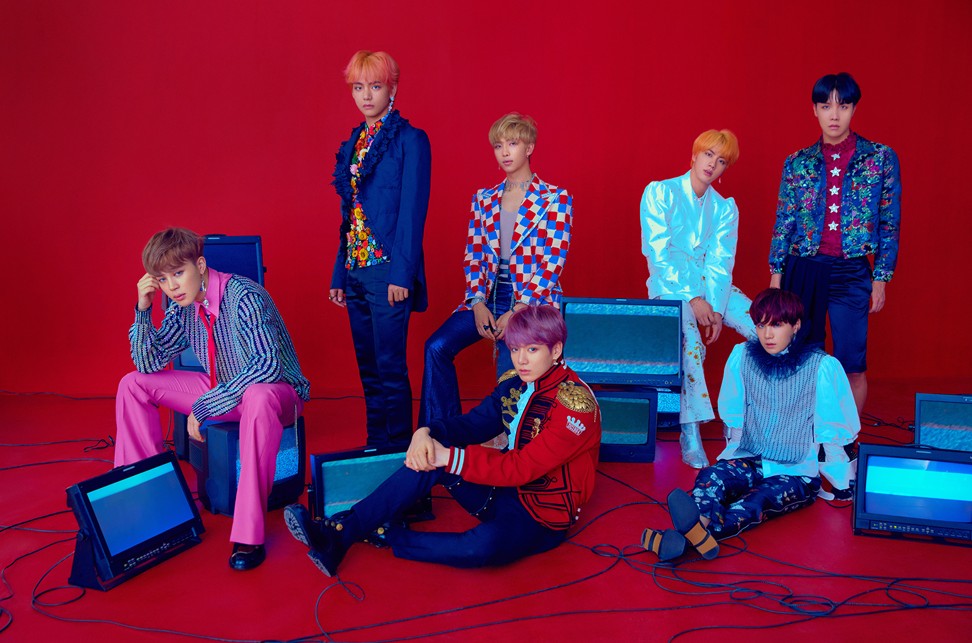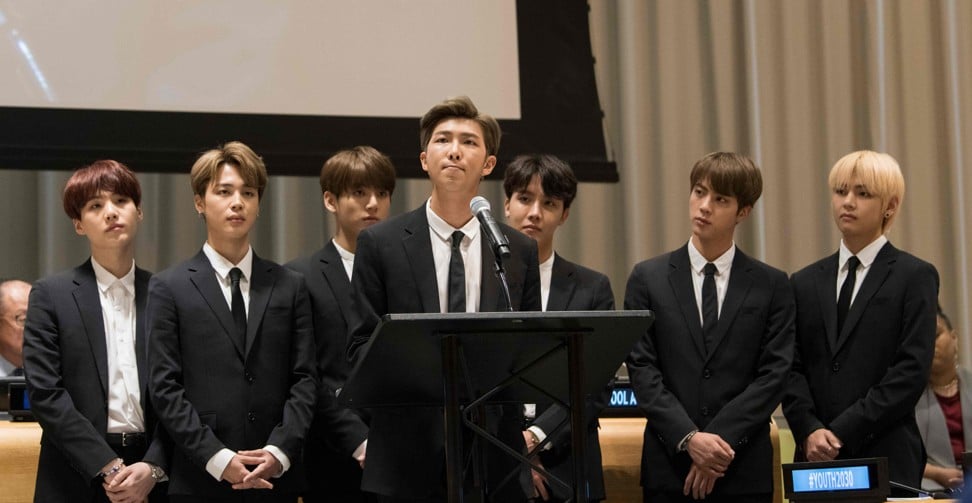
The BTS story: how K-pop’s superstar boy band conquered the world
- It was clear from the group’s debut in 2013 that they had something different, helped by Suga and RM’s background in underground hip hop
- Fans often reference BTS’s first win on South Korean music programme The Show in 2015 as a huge turning point in their story
K-pop outfit BTS are without doubt the biggest boy band in the world, so it was no surprise that their four upcoming shows at Hong Kong’s AsiaWorld-Expo Arena next week immediately sold out.
Their popularity is not confined to one region – or even continent – as the seven-member act are global in every sense of the word. Their story is integral to understanding their remarkable popularity, so let’s take a look at the band’s origins, rise and major achievements over the past six years.
Origins
The seven musicians all shared one bedroom. Their label, Big Hit Entertainment, was a small company within an industry ruled by the “big three” K-pop oligopoly (SM, YG and JYP Entertainment). So despite the band’s meteoric rise, they made their debut as underdogs.
However, there were already hints of their future crossover success as their first single hit reached No 14 on Billboard’s World Digital Songs chart two weeks after it was released. At the same time, they received recognition in South Korea as the best new artist at the 2013 Melon Music Awards.
Rise to fame
Back in 2014, the boys handed out fliers promoting a concert during their reality show American Hustle Life. But now they’re selling out international stadiums within 90 minutes.
So how did BTS get here? Their breakthrough happened in two stages: first in South Korea and then in the US.
Fans often reference BTS’s first win on South Korean music programme The Show in 2015 as a huge turning point in their story. The winning single I Need U not only represented a significant stylistic departure for the boys, but also earned them widespread recognition.
In 2017, the band won the award for top social artist at the Billboard Music Awards. At the time, it was already a big enough deal that BTS were invited to the ceremony. But to beat out the likes of Justin Bieber, Selena Gomez and Ariana Grande? Suddenly, the mainstream US press could see that BTS were leading a phenomenon that deserved recognition.
From BTS to Keyakizaka46, Asian pop stars slammed for Nazi-style dress
Major achievements
Search for the word “first” on BTS’s Wikipedia page and you’ll find a whopping 86 matches. The band earned their first Billboard 200 entry at No 171 with The Most Beautiful Moment in Life, Part 2 in 2015. Since then, their accomplishments have snowballed.
As mentioned, 2017 was the year BTS truly crossed over into the American mainstream. Their stateside TV appearances that year included being on The Late Late Show With James Corden, Jimmy Kimmel Live! and The Ellen DeGeneres Show. The band made their US performance debut at the 2017 American Music Awards, further increasing their fame internationally.

But 2018 is the year that BTS seemed to break records almost every day. They became the first K-pop group to perform at the Billboard Music Awards when they performed Fake Love. They racked up numerous RIAA gold certifications. And two of their albums hit No 1 on the Billboard 200 album chart in the space of a few months.
The South Korean superstars also enlisted some of the West’s biggest artists for various collaborations, including Nicki Minaj, The Chainsmokers’ Andrew Taggart and Steve Aoki.
“I’m very lucky to be collaborating with BTS,” Aoki told the Post in an interview last month. “But it’s like, collaborating with me I don’t think was moving a needle for them, so to speak. We were just having fun, and it’s making it exciting and colourful and different.”
BTS have already proven they’re not a flash in the pan, so there’s a lot of anticipation for how 2019 will play out for them.
“I remember [South Korean singer] Psy stating that he had a difficult time breaking the spell after the Gangnam Style boom, and I’m impressed by how well BTS have managed the sudden hype in the past couple of years,” said Stephanie Choi, a doctoral candidate in ethno-musicology at the University of California, Santa Barbara.
“By now they should have well-established connections with American media and artists, so I expect to see them having balanced appearances in both Korean and American media.”
It is also worth noting that BTS haven’t had to drop their Korean lyricism to find an American audience.
“It’s so powerful that a non-dominant language is globally renowned,” Aoki said. “[The songs] are almost 90 per cent Korean-based. So it’s an absolute bone chiller – it makes your hair [stand up] when you realise you don’t need to speak the dominant language to really get into the hearts and minds of people.”
BTS’s crossover successes have also had a trickle-down effect, with more South Korean artists embarking on solo tours and media blitzes in the US.
“They just did their own thing, and the world went along with that,” Aoki said. “With that laying the groundwork, it also opens it up for all these other artists who might not have had a chance because they don’t speak English or sing in English.”
Love Yourself
“Love yourself” is a recurring theme in BTS’s discography and their message as artists. They aim to remind the younger generation that true love starts with yourself, as RM put it on the US television show Good Morning America.
Their “Love Yourself” album series oversees the journey to self-love amid the highs and lows of an ill-fated romance. If the series is a story arc, “Love Yourself: Her” is the rising action, “Love Yourself: Tear” the falling action and “Love Yourself: Answer” the resolution.
The “love yourself” motif appears in various ways throughout the album series. There’s the effervescent hook from Idol, where the members sing: “You can’t stop me loving myself.” Then the series wraps up with a bow on the aptly titled Answer: Love Myself. Spoiler alert: the answer is to love yourself.
Band leader RM repeated the mantra “love yourself” to the group’s fans (also known as the BTS Army) during their Billboard Music Awards speech in 2017: “Please, Army, remember what we say: love myself, love yourself.”
BTS also launched the Love Myself campaign with Unicef in October 2017. The two-year-long partnership sponsors the #EndViolence campaign, which seeks to make the world a safer place for children and teenagers.
The campaign has been funded through direct donations and a percentage of the profits from BTS’s “Love Yourself” albums. As of November 2018, they had raised US$1.4 million.

BTS also made history when RM gave a speech at the United Nations last year. He spoke about his hardships as a young person trying to find himself, and encouraged young people to find their inner voice. Then he introduced a new concept to the “love yourself” theme: “speak yourself”.
“The most impressive part of Army is that they practise the ‘Love Myself’ campaign not simply for their idols but really for themselves,” Choi said.
“BTS and Army are not in a hierarchical relationship, with BTS simply providing thoughts to Army. Rather, they are in a dialectical relationship in which Army also inform BTS about gender issues, racism and world history. They are growing up together.”
